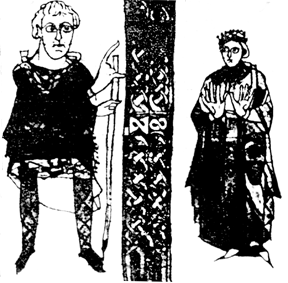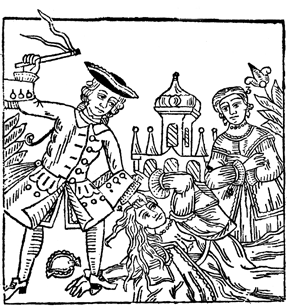Charlemagne lords it over an unnamed woman. Frankish manuscript, 9th century.
The Roman code of patria potestas is a classic form of absolutism, giving the paterfamilias power of life and death over his family and slaves.
The ideology of female servility to the male turns up in various times and places: in Confucian writings, in the Manusmrta and other brahmanic texts lauding the patrivrata (a wife who worships her husband as a god), as well as in countless Christian and Islamic homilies.
These screeds are overwhelmingly authored by men, but sometimes even women will advocate these ideas. The famous woman scholar Ban Zhao did so in ancient China: “The virtues of women are reserve, quiet, chastity, orderliness, governing herself to maintain a sense of shame...”
This Confucian writer urged wives to bend their will to their husbands: “Nothing equals in importance the imperative duty of obedience!” Her instructions have a paradoxical quality at times: "A husband is heaven, and heaven can not be shirked.”
Another female who preached servile marriage was Mwana Kupona binti Msham, a sheikh’s wife on the coast of Kenya. She instructed wives in a Swahili poem of the mid-1800s:
“... seek to please him, and that is how you will find the way. And in the day of resurrection, the decision is his; he will ask what he wants, and what he wishes will be done." She believed that it was for the man to say whether his wife goes to Paradise or “to the fire.”
She advised wives not to speak out or provoke the man's anger, to be quiet, give him whatever he wants, serve him, be available to him, care for his body, keep a clean house, adorn yourself for him, smile at him, and praise him to others; and “do not refuse his commands...”
When you wish to go out, you must ask leave... return home quickly and sit with your master... obey your husbands, that you may meet with no loss in this world and the next...”
A husband whips his wife in public with a riding crop, trampling her arm and tearing her hair and clothing. His sister looks on passively; the caption shows her excusing him on grounds of jealousy. Russian woodcut, 1700s.
Patriarchies Visual Talk
Catalog
Home
patriarchies:
a global view of women's oppression
"How sad it is to be a woman! Nothing on earth is held so cheap."
---Chinese poet Fu Xüan•
“We have mistresses for our enjoyment, concubines to serve our person, and wives for the bearing of legitimate offpsring.” Demosthenes, Kata Neairas, in Private Orations, 59:122 (Greece, 4th century BCE)
•
"If a man carry off a maiden by force, let him pay 50 shillings to the owner, and afterwards buy his will of the owner [male guardian]."
--82nd law of king Aethelbert of England.
(Simply by paying a fine and bridal fee, a rapist could legally force a woman into marriage. This happened when families had cause to fear that no man would marry a daughter who had suffered a rape.)•
In 1293 the papal bull Periculoso ("Dangerous") decreed that all nuns "shall henceforth remain perpetually enclosed." For no reason, not even for their charitable work in hospitals and communities, were they to be allowed to "have the power of going out of those monasteries."
•
"It is a crime against humanity that our women are shut up
within the four walls of the houses as prisoners. There is no sanction anywhere for the deplorable conditions in which our women have to live."
--- Muhammed Ali Jinnah, first prime minister of Pakistan, in 1944•
Runaways were so common in early modern China that the homiletic tract Gong-Guo-Go offered an astronomical 300 merits for "leading back to her home a woman or girl who has escaped."
•
Bound feet was an affliction that women of European tradition also suffered. For example, the upper class females in Lima, Peru, circa 1750:
"From their infancy they are accustomed to wear straight shoes,
that their feet may not grow beyond the size which they esteem beautiful;
some of them do not exceed five inches and a half, or six inches in length...
the shoes are made in such a manner that they never loosen of themselves... [and are] very little calculated for service."
--Juan Jorge and Antonio de Ulloa, A Voyage to South America(So what if those shoes had diamond buckles. Gilded cages...)
•••
"From Bluebeard to Blackstone" Copyright 2000 Max Dashu
excerpt from The Secret History of the WitchesBlackstone codified women's legal nonentity in his Commentaries on the Laws of England. The English woman had no individual legal standing, no rights over her own person, property, or children. A husband could beat and rape her at will, confine her to the house, to a room. It was extremely difficult for a wife to separate from her husband. All she possessed or earned after the separation legally belonged to him.
In law she herself belonged to him, so that a husband could have her hunted down and brought back to him to be punished as he pleased. He could further avenge himself by suing her lover for trespassing and assault, since her consent to relations with another man was considered legally null, like any other contract she made.
Nor could women get divorces on grounds of their husbands' adultery, battery or other mistreatment. One member of Parliament opined in 1825 that it was "meritorious" for a wife to forgive her husband's adultery, but for him to return the favor would be "degrading and dishonorable." [Thmas, 202]
Mary Wolstonecraft—author of Vindication of the Rights of Women—helped her sister Eliza escape from a cruel, battering husband. Since the law would return her to him whatever the circumstances, Eliza was forced into hiding. The abuser automatically got custody of the baby. Wives were presumed without rights to self-defense, and the ancient penalty for treason against husbands still held. In 1725 an English woman was burned alive for killing her husband—and she was only "one of the last." [Olsen, 83]
Dr Samuel Johnson swore that female chastity was paramount since "upon that all the property in the world depends." But of male adultery he declared, "Sir, a wife ought not to greatly resent this." He said he would send his daughter away if she came home because her husband was having sex with the chambermaid. [Thomas, DS 209]
Not long after the French Revolution, the Napoleanic Code gave husbands sole rights over communal property and over their wives. It decreed that "The husband has the right to say to his wife, 'Lady, you belong to me body and soul... lady, you will not go out, you will not go to the theater, you will not see this or that person..."
Under French and Italian law based on the Napoleanic code, women could not make contracts, buy or sell without their husbands' permission. They had to follow a husband to wherever he made his home. Men could divorce wives for adultery, but a woman could only divorce her husband if he brought a concubine into the house. (In practice, given battery and economics, this law offered little protection.) A woman could be imprisoned for up to two years for adultery. [Esistere, 73-6]
All this was right and proper in the eyes of the Church, which offered cold comfort to battered and deserted wives. The influential canonist Alphonsus Liguori instructed confessors to ask wives "if they have obeyed their husbands in all things." [Ranke-Heinemann, 275]
So much was a woman the property of her husband or father that they were spoken of as owners. An English magazine for young ladies advised in 1701, "... your Body is the Goods of your Father, and you can't lawfully dispose of yourself without his knowledge and consent...." [Fraser, 275] One father wrote, "For very need I was fain to sell a little daughter I have for much less than I should have done by possibility." [Thomas, DS, 213]
There are records of husbands selling their wives, and in the 1700s and 1800s it was reported abroad that English men could sell their wives in open market. [Thomas, DS, 213] Another source reports the widespread belief "that a man may sell his wife, provided he does so in the open market, with a halter round the neck." In 1613, at Murhous, Scotland, the drunkard David Fotheringham was tried for selling his wife at market on the Sabbath. [County Folklore, Vol VII, 165-66] (To the Calvinist kirk, the sale itself was less an offense than the violation of the Sabbath.) In 1663 New York colonist Laurens Duyts had his ear cut off for selling his wife. [Olsen, 74] A Rumanian folk song also tells of a man selling his wife at market. [Bratulescu, 313]
Other sales were ongoing: the sale of lower class women as captive whores, and the selling of female paupers and convicts into indentured servitude. The latter involved deportation to English colonies in North America and the Caribbean, and later Australia. A large proportion of early female settlers in the American colonies were sold as servants, others as brides. South Carolina advertised for wives in 1666: "... if they be but civil, and under 50 years of age, some honest man or other, will purchase them for their wives." [Olsen, 77]
It was customary for masters to flog and abuse indentured women. They could rape them without fear of punishment. In fact, the law rewarded them for it. Masters who succeeded in impregnating bondswomen were rewarded with a seven-or-twelve-year extension of the servitude. The law in its majesty enforced chastity only on subject women.
The droit du seigneur survived in its most drastic form in the American institution of chattel slavery. Women of African descent had no recourse against customary rape by masters and overseers. The intersection of racism and misogyny made the violations inflicted on them more virulent than ever. The rapists dismissed their crimes by invoking diabolized, bestialized, hypersexualized stereotypes of blackness, while white ladies often vented their rage at their husbands' infidelities on the enslaved women.

